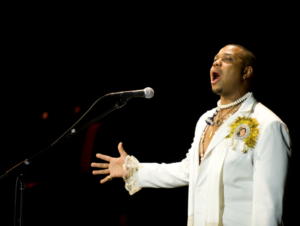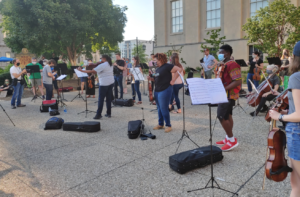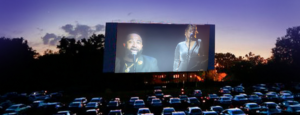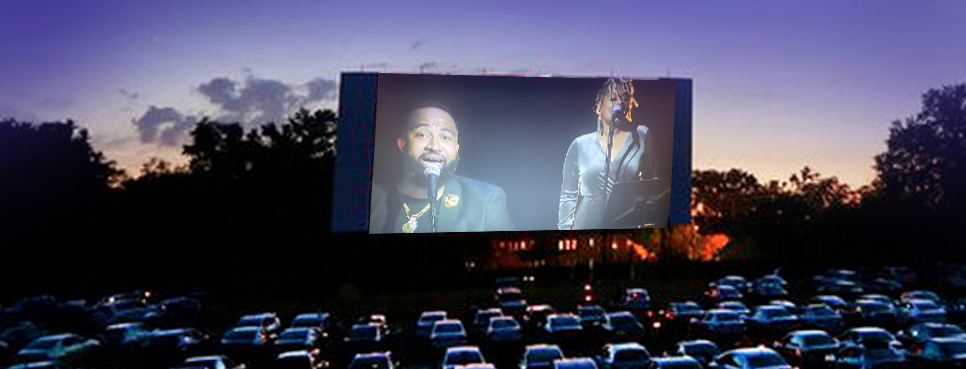The Louisville Orchestra Endures Amidst the Pandemic
Photography Provided
The past year, throughout the COVID-19 pandemic, has been difficult for many businesses. A number of places had to shut down due to lack of customer patronage. Entertainment venues shuttered their doors, which meant the cancellation of concerts, plays and most anything else that involved large crowds. Singers, dancers, actors, musicians and their support crews became unemployed.
Bringing it home, how were people involved in the Louisville entertainment community affected, and what did they do to weather the storm, especially those associated with the Louisville Orchestra?
According to Michelle Winters, the orchestra’s marketing director, everything was sailing along smoothly during the beginning of 2020, without an inkling as to how things were going to change, quite drastically, within a few weeks’ time.
“We had performances on February 22 and 23,” she says. “We performed at the Kentucky Center to a packed house and then we went the next day to St. Stephen Church to perform ‘Gospel in Symphony’ with the church choir. A couple of weeks later on March 14 we were scheduled to perform a world premier by local composer Jacob Duncan with Norah Jones. It was scheduled to be another full, packed house. We were incredibly excited.”
News about the coronavirus soon became more prevalent.
“Word started circulating of the Speed Ball held on March 8, which was kind of a super-spreader of the virus, and one person [from the orchestra] had been at that event and had been exposed,” Winters explains.
Winters says it was very concerning at the time. That Wednesday, March 11, orchestra leaders made the decision to shut down a concert three days away.
“There wasn’t even a minute to think or grieve, or figure what was going to happen or to plan,” she says. “We instantly had to communicate with people. Of course at the time we were getting, ‘You idiots, you’re all just scared of something that doesn’t really exist,’ or, ‘Thank God. We weren’t going to come anyway but we’re so glad you’re doing the right thing.’”
Winters says their next task was to notify everyone who had tickets, try to get the story out to the media fast enough, and get the public’s attention.
The staff notified patrons by email and on the phone. Twenty percent of the March 14 audience asked for a refund, and the rest said they’d like to hold that money in their account.
“That was just one concert,” Winters says.
The staff returned to work the following Monday and began trying to determine what would happen with the next concerts.
“We were sort of tumbling along one concert at a time for about two weeks, trying to figure it all out until we got to the point when we knew the balance of the season had to be canceled,” Winters says.
The orchestra leaders had to cancel 10 public concerts, plus they had to cancel their education concerts, for which school children would come listen to a performance. These education concerts had been in existence since 1941. It was Music Director Teddy Abrams’ goal, and the orchestra’s goal, to keep things on track as much as possible and provide music for Louisville.
“Everybody had to go through a moment of personal reflection, and also organizational reflection if you represented a group,” Abrams says. “In particular, the performing arts recognized this was going to be a major moment of change. Across the board, people throughout the world were wondering if we were going to be experiencing a short-term, a long-term or a life-changing kind of event.”
Abrams says the orchestra members were very realistic when considering what they would need to do to adapt.
“We had made one really early smart decision,” Abrams says. “We didn’t hope for the best. We used the opportunity of having a momentous kind of tectonic shift in the way people think and work, to actually move forward with some of our biggest visions and longest-range concepts for what an orchestra can do for its community.”
The orchestra members did not want to take advantage of a challenging situation in a negative way, Abrams says.
“On the other hand, if that is a path towards thinking bigger and being more effective, and doing what you’re capable of doing even better, then that can turn a very negative and very tragic situation into something that ultimately breeds new life and allows you to flourish,” Abrams says.
That’s what the orchestra members wanted to do – find a way to work through the roadblocks presented by the pandemic.
“I think we were very realistic with the challenges, and the difficulties and the tragedy,” Abrams says. “There was never anything other than clarity about that. What we really did was step back and ask, ‘What can we do for our community that needs us more than ever?’”
Abrams points out that Louisville was going through many difficult situations during the past year.

“We have COVID and its continuing ramification, but we have Breonna Taylor, and we have the changes in downtown and the way people perceive Louisville,” he says. “Clearly music, as a healing part of society, as a mechanism for bringing people together and giving each other pride in their city – clearly that’s going to be needed to a heightened and more critical state. That was what we set out to do.”
Abrams explains how all of this led the orchestra down what he refers to as a “triple path.” These paths center upon needing to affect the positive health of our community, create opportunities for equal access to their music, and do something that changes the way people perceive Louisville and the way we perceive ourselves.
“We need to give people pride about being from Louisville, and we need to give the outside world a glimpse of what Louisville can do at its very best,” he says.
The orchestra began building their programming for the COVID year and beyond, based upon those principles.
“It led to a really amazing state of creativity and growth,” Abrams says. “Last season we were able to play an entire season of music making, when many other orchestras weren’t able to do anything.”
He explains that many of the biggest orchestras in the United States basically had to wait it out, and either had to furlough their entire staff of musicians, or tried to do small-scale performances when health regulations allowed.
“We had, by great fortune, helped design the Old Forester’s Paristown Hall, which is part of the Kentucky Center’s properties,” Abrams says. “We had designed it specifically with technology in mind, even though we weren’t planning for a pandemic. It turned out that all the investment that was made to allow the orchestra to play at Paristown Hall was perfect for us to move in, and it was very easy to make a strictly social-distanced, safe environment for our musicians and staff, because that was the priority.”

During their rehearsals they had a very comprehensive safety guideline and policy set that they enforced, because if there was any spread they would have had to shut down. Twice per week the staff, musicians, any extra musicians and guest artists had to get tested for COVID-19.
On stage everyone had different entrances, everybody had a mask, and mesh masks were placed over the bells of instruments. There was plexiglas between performers, and they had special fans installed by air-flow experts. The orchestra placement was also changed so the winds wouldn’t blow air on the stringed-instrument players.
“That was the biggest trip of all,” Abrams explains. “It would be like a football team with the defense playing offense and vice versa. It was very weird. Nobody ever grumbled. Everybody knew how lucky we were to be playing music. Everybody was thrilled. We made do.”
Another positive aspect rising from the darkness of the pandemic was a project Abrams was asked to work on, which came forth from Mayor Greg Fischer, called Lift Up Lou.
“That was really designed to provide the city with opportunities to be creative, to experience art and artists while they were isolated, and to eliminate some of the isolation to make them feel more connected to each other,” Abrams says. “It was a cultural initiative.”
Abrams says two major accomplishments came from this initiative. A massive group song called “Lift Up Lou” was created, co-composed by 27 Louisville musicians including Jim James from My Morning Jacket, Will Oldham, who is known as Bonnie “Prince” Billy, Ben Sollee, and a whole host of talented artists.
“The other big thing is that we created the Louisville Arts Network,” Abrams says. “We ended up with nearly 200 pieces of art in all genres, from music to weaving to visual art.”
Abrams is excited for the orchestra’s upcoming 2021-2022 season.
“We’re creating this kind of journey, which is bookended by celebrations of the city,” he says. “The first concert is two kinds of sets of music. The second half is Tchaikovsky’s 6th Symphony. It’s called the ‘Pathetique,’ and while it is tragic it also has moments of real joy. It’s not something that just makes you forget about the year and a half we’ve had. It’s a real reflection, and that’s important for us to acknowledge.”
“The first set of music that people will hear is all by Louisville composers,” Abrams continues. “We have seven different Louisville musicians to create a new piece of music that’s a reflection on what they’ve experienced. We felt that having a tie to locals is important. Also, providing opportunities for local musicians to share our space is important for us.”
The orchestra will also begin a four-year exploration, which delves deeply into the relationship between Jewish artists who had their careers either altered or ended during the Holocaust, and black artists in America – black composers and black musicians – who experienced similar effects on their careers because certain opportunities were not provided to them.
“There’s a deep, deep relationship between black and Jewish artists,” Abrams says. “If you think about spirituals that are all Old Testament, they’re inspired by the Exodus story,” he says. “You think about Gershwin writing jazz and having an all-black cast in ‘Porgy and Bess’ when it was premiered. You think about all of the great jazz artists who were black, who were singing songs by Jewish composers like the Gershwins or Irving Berlin and so on.”
Other concerts during the orchestra’s season will explore Latin American music, and one of Abram’s friends, pianist Yuja Wang, will perform a piano concerto composed by Abrams.
“She is one of the most sought-after pianists alive,” Abrams says. “She is a huge, huge, huge star. She played with the Louisville Orchestra years ago, and she is as big as they get in the classical music world.” When asked what final thoughts he would like to convey to Louisville, Abrams responded as follows.
“The overall message from us is that we’ve been working for the city this whole time to give them the kind of musical institution that they deserve, and I want to make sure that everybody understands that we didn’t take this year off,” he says. “We didn’t make it easy on ourselves and take the easy way out. We did what we felt was right for our town, to have a great orchestra that serves the community first and foremost. We don’t start by asking how the community can help us. We ask, ‘How do we serve the community?’”






